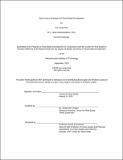| dc.contributor.advisor | Andrea M. Chegut. | en_US |
| dc.contributor.author | Park, Sun Jung Park,S.M.Massachusetts Institute of Technology. | en_US |
| dc.contributor.other | Massachusetts Institute of Technology. Center for Real Estate. Program in Real Estate Development. | en_US |
| dc.date.accessioned | 2021-01-06T17:40:02Z | |
| dc.date.available | 2021-01-06T17:40:02Z | |
| dc.date.copyright | 2020 | en_US |
| dc.date.issued | 2020 | en_US |
| dc.identifier.uri | https://hdl.handle.net/1721.1/129099 | |
| dc.description | Thesis: S.M. in Real Estate Development, Massachusetts Institute of Technology, Program in Real Estate Development in conjunction with the Center for Real Estate, September, 2020 | en_US |
| dc.description | Cataloged from student-submitted PDF of thesis. | en_US |
| dc.description | Includes bibliographical references (pages 43-45). | en_US |
| dc.description.abstract | Big data and the increasing usage of data science is changing the way the real estate industry is functioning. From pricing estimates and valuation to marketing and leasing, the power of predictive analytics is improving the business processes and presenting new ways of operating. The field of affordable housing development, however, has often lacked investment and seen delays in adopting new technology and data science. With the growing need for housing, every city needs combined efforts from both public and private sectors, as well as a stronger knowledge base of the demands and experiences of people needing these spaces. Data science can provide insights into the needs for affordable housing and enhance efficiencies in development to help get those homes built, leased, or even sold in a new way. This research provides a tool-kit for modern-day real estate professionals in identifying appropriate data to make better-informed decisions in the real estate development process. From public city data to privately gathered data, there is a vast amount of information and numerous sources available in the industry. This research aims to compile a database of data sources, analyze the development process to understand the key metrics for stakeholders to enable decisions and map those sources to each phase or questions that need to be answered to make an optimal development decision. This research reviews the developer's perspective of data science and provides a direction that can be used to orient themselves during the initial phase to incorporate a data-driven strategy into their affordable multi-family housing. | en_US |
| dc.description.statementofresponsibility | by Sun Jung Park. | en_US |
| dc.format.extent | 45 pages | en_US |
| dc.language.iso | eng | en_US |
| dc.publisher | Massachusetts Institute of Technology | en_US |
| dc.rights | MIT theses may be protected by copyright. Please reuse MIT thesis content according to the MIT Libraries Permissions Policy, which is available through the URL provided. | en_US |
| dc.rights.uri | http://dspace.mit.edu/handle/1721.1/7582 | en_US |
| dc.subject | Center for Real Estate. Program in Real Estate Development. | en_US |
| dc.title | Data science strategies for real estate development | en_US |
| dc.type | Thesis | en_US |
| dc.description.degree | S.M. in Real Estate Development | en_US |
| dc.contributor.department | Massachusetts Institute of Technology. Center for Real Estate | en_US |
| dc.identifier.oclc | 1227098997 | en_US |
| dc.description.collection | S.M.inRealEstateDevelopment Massachusetts Institute of Technology, Program in Real Estate Development in conjunction with the Center for Real Estate | en_US |
| dspace.imported | 2021-01-06T17:40:01Z | en_US |
| mit.thesis.degree | Master | en_US |
| mit.thesis.department | RED | en_US |
